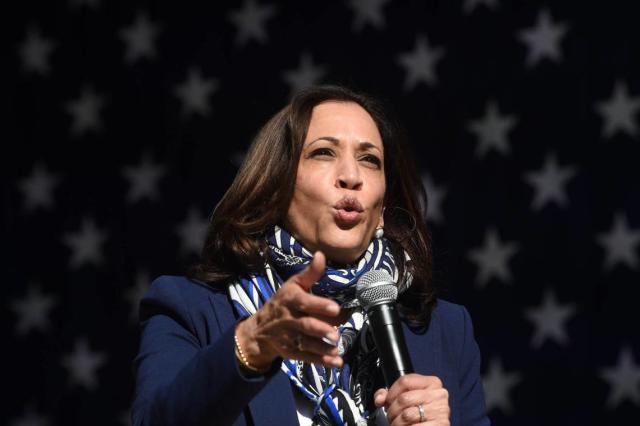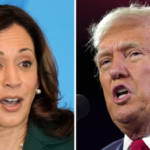
Democrats may be rallying around Kamala Harris as their likely presidential nominee, but the vice president has some ground to make up with at least one critical constituency: Hispanic voters.
National polls — most of which were conducted before President Joe Biden bowed out of his reelection bid and endorsed Harris to replace him on the Democratic ticket — show Harris struggling to win the kind of support among Hispanic voters that Democratic candidates have long counted on.
The lagging enthusiasm among one of the nation’s fastest-growing electorates isn’t a new problem for Democrats. Before he ended his reelection bid on Sunday, Biden also grappled with flagging support among Hispanic voters, a diverse constituency that was once considered reliably Democratic.
Now, with Biden out of the running and Harris emerging as the likely Democratic nominee, the onus is on the vice president to make up lost ground.
“There’s definitely work to be done,” said Fernand Amandi, a Miami-based Democratic pollster who worked on former President Barack Obama’s 2012 reelection campaign. “It’s not going to be the instant shot in the arm that it’s proving already to be with some other voters. But the good news for Team Harris is there is an opportunity to relaunch and reset the entire presidential campaign with Hispanic voters. They were underperforming before. And the only way to go is up, in terms of potential ceiling.”
Amandi’s polling firm, Bendixen & Amandi International, fielded a survey earlier this month that found both Biden and Harris scoring just 42% support among Hispanics nationally, roughly on par with former President Donald Trump, who notched 41%. By comparison, Biden and Harris won 65% of Hispanic voters in the 2020 presidential election, according to exit polling from Edison Research.
Likewise, another poll released on on Monday by Quinnipiac University. showed Harris and Trump tied among Hispanic voters at 39% each in a multi-candidate field that also included third-party and independent hopefuls, like Robert F. Kennedy Jr.
Amandi cautioned against putting too much weight on recent polls. He said that Biden’s decision to bow out from the campaign thrust the country into a “completely different political environment,” and argued that the coming weeks — when Harris will likely name a running mate and formally accept the Democratic nomination — will offer more clues about where her support among Hispanic voters stands.
“We’re going to have to reevaluate everything,” Amandi said. “Was Biden underperforming among Hispanics? Absolutely, no question. But this is an opportunity now to see what this new ticket does and whether it can get Hispanics to revert back to the mean.”
A spokesperson for Harris’ presidential campaign did not respond to the Miami Herald’s request for comment.
Democrats have long relied on robust support among Latinos to rack up electoral wins, both nationally and in states like Florida and Arizona. But cracks have formed in that coalition in recent years, as Republicans have ramped up their efforts to appeal to those voters.
Harris has a track record of turning out Latino voters in her home state of California, which has the largest Hispanic population in the country. She won a majority of the Latino vote in 2010 and 2014 in her two campaigns for state attorney general, but fell short of the 50% mark during her 2016 Senate campaign against fellow Democrat Loretta Sanchez.
She has also racked up support from influential groups like Voto Latino and BOLD PAC, a Democratic political action committee aligned with the Congressional Hispanic Caucus.
But that kind of support isn’t likely to dramatically change Harris’ fortunes among Hispanic voters, said Mike Madrid, a longtime Republican political consultant in California and staunch Trump critic. He said that Democrats’ increasing difficulties with Latino voters is part of a decade-long trend that has seen Latinos increasingly align with Republicans.
Kamala has the ability to begin reframing this, but to think that she’s going to fundamentally restructure the race with Latinos is unlikely,” Madrid said. “They’ve got to start understanding that they have a problem with this base vote. It’s not a candidate problem.”
There are still some signs that Hispanic voters might be more eager to back Harris for president than Biden. A CNN/SSRS poll released on Wednesday
found Harris with a slight, albeit statistically insignificant, 47%-to-45% lead over Trump among Hispanic voters. Earlier polling found Biden trailing Trump among those voters by nine percentage points.
College released on Tuesday painted an even brighter picture for Harris. That survey showed her garnering the support of 47% of Hispanic voters nationwide, while Trump notched just 31%.
But some pollsters suggested that Harris’ bump in support may also be the product of a honeymoon period where voters — weary from weeks of wondering whether or not Biden would stay in the race — are temporarily rallying around the idea of a new Democratic candidate.
Mike Noble, an Arizona-based pollster who works throughout the Southwest, said while Harris may give Democrats a new standard bearer, her candidacy doesn’t change the fundamentals of the presidential race. Harris, he said, “isn’t some outsider candidate. She’s Biden’s right-hand person. She still has to answer to the electorate’s concerns when it comes to inflation, housing affordability and immigration.”
Because of that, Noble said that he doesn’t see the Hispanic vote suddenly swinging wildly in Harris’ favor. Voters of all kinds, he said, are largely locked into their political corners, and aren’t likely to experience a drastic change of heart now that Biden’s out of the running.
“I don’t think [the race] resets,” Noble said. “The electorate is so polarized right now, and that’s the inherent problem. You’re not going to see these big swings.”



